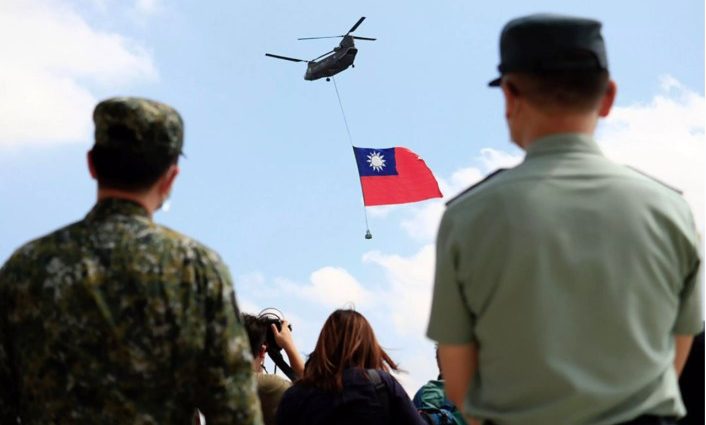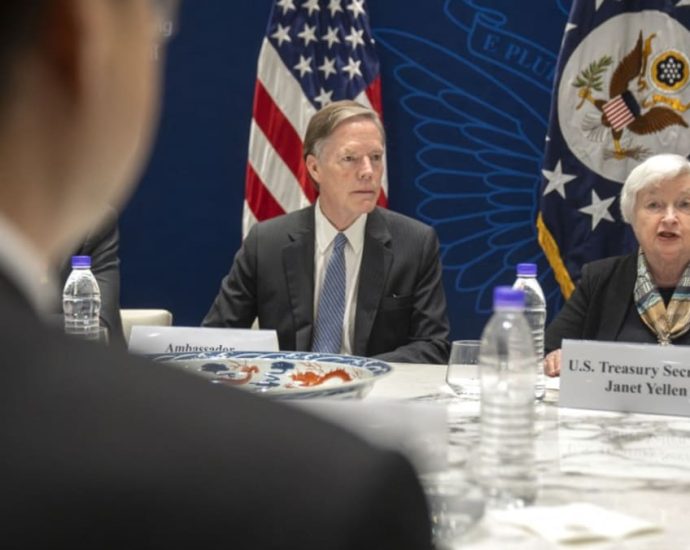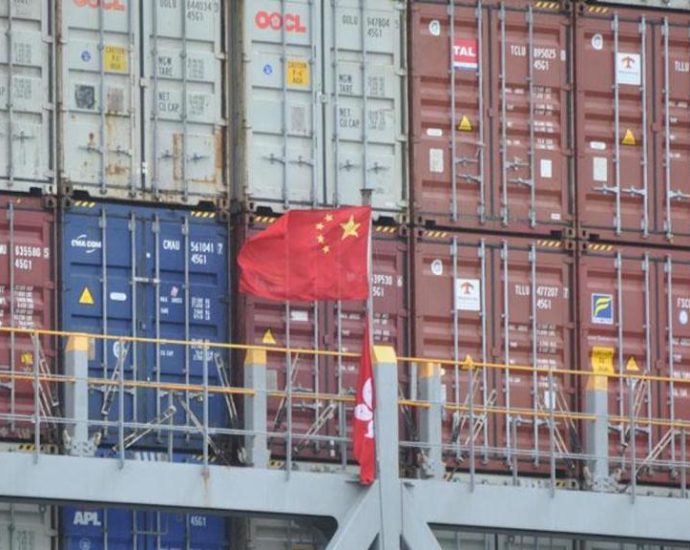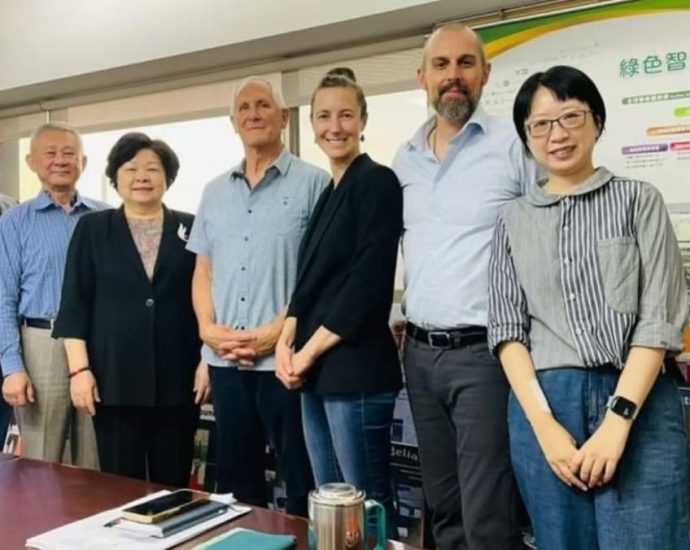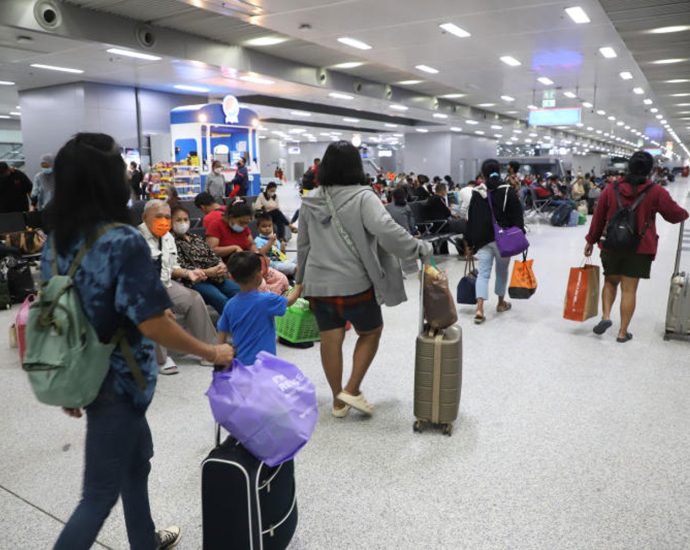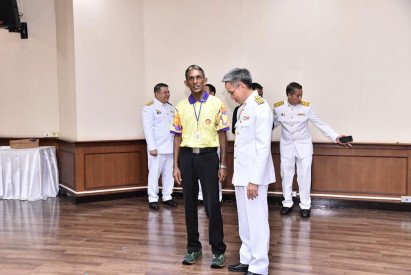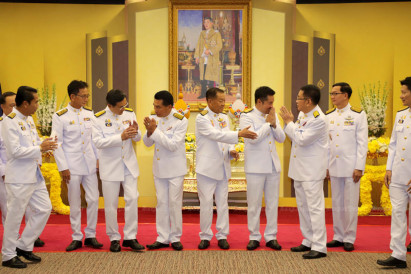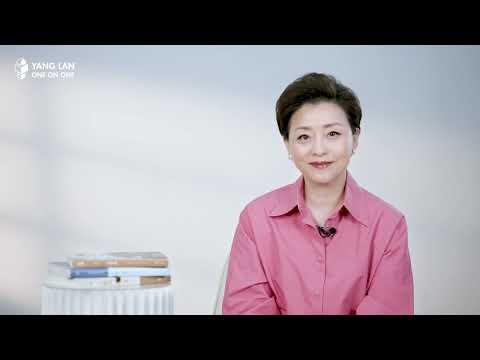US-China relations need a new set of guardrails
In June 2023, four months after a wayward surveillance balloon blew his impending visit off course, US Secretary of State Antony Blinken visited Beijing to set about erecting the “guardrails” US President Joe Biden and Chinese President Xi Jinping envisaged in Bali in November 2022.
He was followed in early July by Treasury Secretary Janet Yellen. The United States and China may be close to stabilizing their rocky relationship — an opportunity they must not pass up.
The Biden administration’s strategy on China has been to invest in domestic competitiveness, align efforts with a network of allies and partners and, harnessing these assets, compete with China. The administration has also sought to isolate China via the Summit for Democracy, Quad and Indo-Pacific Economic Framework and through bodies such as the G7.
Having incentivized or leaned on allies to chip away at their relationships with China, Washington now seeks to establish a “floor” under its own working relations with Beijing.
For China, forging the “least worst” relationship with the United States retains value from a geopolitical and developmental standpoint, given ties could yet hurtle to the point of total breakdown.
There are no illusions, though, that bilateral trade and technology frictions are a mere economic matter. They are intended to suppress China’s development and rise – eliciting calls for “self-reliance.”

US-China guardrails must be cognizant of these eroding political foundations. To be durable, they must abide by certain broad understandings.
The “pressure valve of dialogue” must become the “first and most fundamental” guardrail on the relationship. While beneficial engagement cannot coexist with coercion, dialogue must not be construed as leverage or a favor to be bestowed.
Dialogue must be based on mutual respect. Both sides are at liberty to introduce sanctions for national security or public interest reasons. Akin to the European Parliament’s suspension of ratification of the European Union-China investment agreement in May 2021 following Beijing sanctioning some EU actors, neither side should harbor the illusion that business-as-usual measures or open channels of communication can be maintained with sanctioned parties.
Next, the practice of self-restraint rather than the pursuit of behavior modification of the other must become standard order. Both Washington and Beijing must rise above their visions of ideology and sculpt a durable consensus. This includes the formation of civilian-led crisis management channels, rather than solely relying on the unsatisfactory military-to-military mechanisms.
Just because the Shanghai Communique-inaugurated era of strategic cooperation has died does not axiomatically mean the United States and China are fated to succumb to conflict. An intermediate equilibrium is realisable but its authorship will require exceptional diplomatic skill.
Third, US-China relations must be framed with the view to reassuring the other and narrowing differences without losing sight of the underlying challenges. In Bali, Xi had proffered “three noes.” China does not seek to change the existing international order, does not interfere in the United States’ internal affairs and has no intention of displacing the United States.
Biden tendered “five noes.” The United States does not seek a new Cold War. It does not seek to change China’s system. The revitalization of its alliances is not directed at China. It does not support Taiwanese independence. And it does not seek conflict with China.
These assurances provide a ballast to steady the ship of US-China relations. It serves little purpose for either side to dwell on the underlying intentions of its counterpart’s assurances. Both sides should accept them in good faith and aspire to memorialize them in a joint communique if the opportunity arises.
Fourth, both parties must endeavor to abide by the inviolability of each other’s territorial interests. Washington vowed in the Shanghai Communique that it would “not challenge [the Chinese] position” that Taiwan is a part of the People’s Republic of China — even as it “acknowledge[d]” but did not “recognize” Taiwan to be part of China.
Today, the United States relentlessly challenges that proposition, including stripping out the phrase “Taiwan is a part of China” from the State Department’s fact sheet on Taiwan relations. The challenge must stop and Washington must credibly signal that its “one-China policy” is not being hollowed out.

For its part, Beijing must credibly signal that peaceful reunification remains on the table and that there is no specific timeline for reunification. Episodes like the balloon incident must not be repeated either. But until China’s human rights record improves and the state’s intervention in the economy is reduced, the profound perceptual gap between the two sides will not markedly narrow.
Finally, both sides must anchor their relationship in settled international law. China must fully comply with the South China Sea arbitral tribunal’s award. The ruling by a Law of the Sea Annex VII-constituted tribunal that the United States’ sprawling Diego Garcia military base in the Western Indian Ocean is effectively housed on illegally occupied Mauritian territory (under British colonial administration) is also binding.
Successor arrangements must be arrived at with due regard for Mauritius’ sovereignty. World Trade Organization (WTO) rulings must be honored too. The international trading order is, after all, part of the “rules-based order.”
Prospects for sustained progress in US-China relations may be modest in the near term. Depending on the result of the 2024 US presidential election, an opportunity to craft a more durable strategic framework might open up. To seize that opportunity, much hinges on getting the guardrails right at the present.
Sourabh Gupta is a Senior Fellow at the Institute for China-America Studies in Washington, DC.
This article was originally published by East Asia Forum and is republished under a Creative Commons license.
US-China cooperation in climate finance ‘critical’: Yellen
BEIJING: It is “critical” for Washington and Beijing to keep working together on climate finance, US Treasury Secretary Janet Yellen said Saturday (Jul 7), urging deeper cooperation in addressing the “existential threat” of global warming. Yellen is on a four-day trip to Beijing, as the United States seeks to coolContinue Reading
US-China decoupling headed in a dangerous direction
The US and Chinese economies are closely interconnected, but their ties are eroding. Despite record levels of US-China bilateral trade in 2022, the trading relationship is becoming less interdependent. Rising tensions between Washington and Beijing are driving US and Chinese investors away from each market.
Perhaps the most consequential aspect of US-China decoupling is in technology. Security competition between the United States and China is increasingly embedded in approaches to domestic industrial and technological development. This tech war will hurt both economies and have profound global implications.
Bilateral trade between the United States and China continues to expand despite the trade-war tariffs and escalating tech restrictions that the United States has imposed on China. But bilateral trade expansion is slowing and is growing at only one-fifth the pace of the overall US trade expansion.
The share of US imports coming from China has declined, while China has shifted some imports of foreign goods away from the United States. The composition of US-China bilateral trade has also shifted away from goods with the highest tariffs.
Data on bilateral trade alone does not show the full picture of US-China commercial ties. Since the tariff war began, China’s direct investment in Southeast Asia has skyrocketed — reaching US$128 billion in 2020. US imports from Southeast Asia are also expanding rapidly.
But China’s share of the imported content in Vietnam’s exports nearly doubled from 2017 to 2021. Similarly, Chinese firms elsewhere in Southeast Asia source a large share of the parts and components in their US exports from China. The Chinese content of US imports from Southeast Asia is likely on the rise, offsetting the slowdown in direct US imports from China.

Cumulative direct investment in China by US firms reached $124 billion in 2020, according to data from the Office of the United States Trade Representative. But the 25th annual China Business Survey by the American Chamber of Commerce in China shows that a declining share of US companies see China as an investment priority because of rising tensions, a lack of regulatory consistency in China and rising costs of labor.
The survey also shows that though most US firms operating in China plan to stay, a rising share are considering shifting supply chains out of China — including Apple and Google.
Prospects of US investment in China are clouded by potential US restrictions on outbound investment to China. The Biden administration is concerned that US investors may be helping to advance Chinese technology in critical sectors and is developing a mechanism to constrain the flow of US investment into China.
But because US firms constitute a relatively small portion of total foreign direct investment, such a screening scheme will only be effective if other states are involved. The difficulties of convincing others to develop similar programs may be causing the delay in the launch of a US outbound investment screening scheme.
Private and state-owned Chinese firms are facing greater scrutiny in the United States. The Committee on Foreign Investment in the United States has seen its investigations involving Chinese investors surge since 2021.
Among all jurisdictions, investors from China face the most scrutiny. The most recent high-profile case involves TikTok, whose CEO was recently grilled by the US Congress. The company now faces the risk of being banned in the United States unless it splits from its Chinese parent company ByteDance.
US-China decoupling in technology is undoubtedly intensifying. Beginning with Trump’s restrictions on US exports to Huawei in 2018, the United States has been stepping up its tech restrictions on China in the past five years. By the end of 2022 about 400 Chinese persons on the Specially Designated Nationals and Blocked Persons list were prohibited from engaging in any transactions involving US persons.
In March 2023, 665 Chinese companies on the US Entity List were subject to restrictions on the flows of certain technology and goods from the United States. China responded with its own Unreliable Entity List in September 2020. So far only two US aerospace and defense companies are listed and prohibited from trading with or investing in China.
US-China technological decoupling escalated in September 2022 when US National Security Advisor Jake Sullivan announced a profound shift in US economic policy on China. Rather than designing export restrictions to keep China’s critical technologies a generation behind that of the United States, the US objective is now to freeze China’s current level of technological development.
As the US tech frontier continues to expand, the gap between the two countries would widen, causing China to fall further behind.
In October 2022, the Biden administration announced export restrictions on certain equipment and services to Chinese semiconductor companies, aiming at slowing China’s ability to produce advanced chips – a US national security concern. Japan and the Netherlands have joined the US effort in restricting exports of semiconductor manufacturing equipment to China.
Given the stated US goal in maintaining “as large of a lead as possible” in semiconductors, quantum computing, artificial intelligence and other critical sectors, it is not surprising that China’s President Xi Jinping has stated that the United States attempts to contain, encircle and suppress China.

China is now pouring hundreds of billions of dollars into cutting-edge technologies to achieve self-sufficiency. The West’s economic sanctions following Russia’s aggression against Ukraine worry Chinese leaders who fear similar sanctions could be applied to China if it pursues reunification with Taiwan.
Technological decoupling raises serious concerns about global growth in the short and long term. A 2021 IMF study identifies three direct channels where technological decoupling can affect global growth — reduced global trade flows, misallocation of resources and less cross-border knowledge diffusion.
Together with trade fragmentation and “friend-shoring”, technological decoupling can lead to significant economic losses globally. The drive for self-sufficiency is costly and success is not guaranteed.
Reining in techno-nationalism is in the United States and China’s interests, but the political reality in both capitals is making rational policy formulation extremely difficult.
Nicholas R Lardy is Non-resident Senior Fellow at the Peterson Institute for International Economics. Tianlei Huang is Research Fellow and China Program Coordinator at the Peterson Institute for International Economics.
This article was originally published by East Asia Forum and is republished under a Creative Commons license.
US firms snub ‘de-risking’ to give China another shot â but theyâre finding a new obstacle
“It could not have been a warmer reception than what we received,” said American businessman Jeff Bowman after spending a week in China last month. Bowman is the CEO of the US materials science company Cocona, with his unique sweat-drying Masterbatch additive for yarn garnering significant interest in the China-basedContinue Reading
Central terminal courts single bidder

Only one company has bid for the commercial development of Krung Thep Aphiwat Central Terminal despite three firms having purchased invitations to tender, the State Railway of Thailand (SRT) announced on Friday.
Ekkarat Sriarayanpong, head of the SRT governor’s office, said the SRT had four projects that recently opened for bidding. First was the commercial use project the SRT expects to have a private company develop, covering 47,675 square metres at the central terminal.
Three companies procured invitations to tender: Central Pattana, King Power Suvarnabhumi and Prem Group Engineering. However, only Prem Group Engineering ended up bidding, Mr Ekkarat said.
The second project is managing a 2,303m² advertising space at the central grand station. Plan B Media and King Power International purchased invitations to tender, but neither has bid for the project, he added.
The third project is to develop a 3,759m² space at 12 stations on the Red Line electric commuter train service, which connects the central station to the Rangsit area in Pathum Thani. No one purchased an invitation to bid, Mr Ekkarat said.
The fourth project is to manage 2,080m² of advertising space at the 12 Red Line stations. Plan B Media and King Power International also bought invitations to tender but elected not to proceed.
Mr Ekkarat said after the deadlines to submit the bidding proposals for all four projects ended in the middle of this week, only one company — Prem Group Engineering — bid for the first project.
The SRT will review the company qualifications and will announce the result next Thursday, he said.
The SRT will then check its technical proposal on Aug 15 and open the bid proposal on Aug 16 the following day.
As for the remaining three projects for which the SRT has yet to find bidders, its selection committee will conclude a report for the next board meeting to find solutions, he said.

Krung Thep Aphiwat Central Terminal, formerly known as Bang Sue Grand Station, in Chatuchak district, Bangkok. (Photo: Nutthawat Wichieanbut)
Three railway workers arrested over India’s deadly train crash
Relatives spent days combing through possessions and looking at post-mortem pictures of those killed in the crash, to identify their loved ones. At least 850 others were injured in the collision. Days after the accident, India’s railway minister Ashwini Vaishnaw said the crash was the result of an issue withContinue Reading
Sri Lankan mahout honoured by royals

Their Majesties the King and Queen presented a gift to a Sri Lankan mahout who took care of the ailing Thai elephant Sak Surin, now in 30-day quarantine in Lampang province, after being flown from Sri Lanka on July 2.
Air Marshal Pakdee Saengchuto, deputy private secretary to the King, represented the monarch on Thursday to provide the gift to Don Upul Jayarathna Denelpitiyage, the mahout from Dehiwala Zoo in Sri Lanka, according to the Ministry of Natural Resources and Environment’s Facebook page on Friday.
The ceremony was held at the ministry, with permanent secretary Jatuporn Buruspat and Mr Denelpitiyage attending.
Mr Denelpitiyage accompanied an official Thai team to fly from Sri Lanka to Thailand to help care for Sak Surin, who is now being looked after at the Thai Elephant Conservation Centre. Mr Denelpitiyage returned to Sri Lanka on Friday.
The ministry spent about 19 million baht caring for 30-year-old Sak Surin and bringing him back to Thailand for medical treatment.
He is one of three elephants Thailand sent to Sri Lanka to strengthen diplomatic relations following a Sri Lankan request for the Thai government to send elephants to carry the Lord Buddha’s relics in special religious ceremonies.
Meanwhile, the Thai ambassador to Sri Lanka on Friday said Pratu Pha, another 49-year-old male elephant, has been living under normal conditions in the island nation, adding that there are no plans to bring him back to Thailand.
Ambassador Poj Harnpol said he visited Pratu Pha at Wat Sri Dala Maligawa (Temple of the Tooth Relic) in Kandy City where the elephant is kept, on Thursday. The visit was made at the invitation of Pradeep Nilanga Dela Nilame, the temple caretaker.
Mr Poj said Pratu Pha lives in an open courtyard — with a concrete and soil surface — marked by ropes to indicate boundaries.
The elephant’s front legs are chained to two big trees, while one of the hind legs is lightly chained, allowing it to move and stand naturally.
Pratu Pha can consume food such as leaves from kithul trees, grass and sugar cane as normal, said the ambassador.
During his 30 minutes of observation, the elephant did not display any signs of aggression, and a mahout could feed the animal from a distance.
Mr Poj emphasised the importance of improving the landscape and ensuring adequate water sources and water tanks for the elephant’s well-being.
“Although the general condition is satisfactory to some extent, Pratu Pha’s living conditions could still be improved,” the envoy said.
“We acknowledge the efforts being made by the temple, and the situation cannot be changed in a day. We will work towards better care,” he said.
In an interview with Sri Lankan media, Mr Poj said Thailand has no plans to return Pratu Pha, who is also known as Thai Raja.
Pratu Pha was gifted to Sri Lanka 37 years ago, while Sak Surin and another male jumbo, Sri Narong, were sent there 22 years ago as goodwill gifts.
Why Lunoji founder Adrian Lim took a 75% pay cut to design pet products

From a one-man operation, Lunoji has now expanded to a team of four, including two designers and one marketing person. His mother, who is currently clear of cancer, also helps part-time, making treats and blends, and fulfilling orders.
“The biggest issue we had, and still have, is funding,” said Lim, who currently pays himself a modest salary of S$2,500 a month to channel more money into the business.
“When I walk past places like Tori-Q where the salary of full-time staff starts from around S$2,800, I sometimes question myself. Am I stupid for doing this? Because I could be earning close to S$10,000 with my previous job. There is a lot of sacrifice,” he admitted.
But he has no regrets embarking on this journey, which has also helped in his recovery from depression – Lim was able to go off medication last year.
“To say, I thought of an idea and now we’ve got thousands of them all around the world is priceless.
“With this business, I can really see the impact of what I do on people’s and animals’ lives. One of the little things I like to do is just lie on my bed and watch the Instagram stories and posts that people tagged us on. My bank account is empty but my heart is full,” he said.
Reprieve for the old guard?

The election of Wan Muhamad Noor Matha, former leader of the Prachachat Party, as House speaker this week may have seen the Pheu Thai Party’s chances of ushering in a new, younger beginning slip through its fingers.
Despite the May 14 election now long gone, some senior members of the second-largest party may be finding it hard to sleep at night.
They have every reason to feel anxious, especially after a spectacularly poor showing at the polls, which is something the party cannot afford to ignore, according to an observer.
In fact, it has been reported that a major shake-up is on the way in Pheu Thai, which is looking to rebrand itself and hopefully “young” itself up in the process.
The election result, which handed the party 141 seats, was a nasty wake-up call for Pheu Thai, which found itself relegated from being the biggest party in the 2019 poll to first runner-up this time.
Pheu Thai, still grappling with the humiliation of the electoral defeat, is not about to place an elephant in the room by overlooking the critical mistakes it made, which saw the party fall way short of its target of scoring a landslide win with 300-plus seats.
The observer said it would not be unrealistic to expect that some party heads will roll, and that will likely happen before cabinet appointments are decided.
The election defeat might also bring an opportunity as it allows for the party to be overhauled, especially in the strategy area and top executives associated with running Pheu Thai.

Paetongtarn: Viewed as ‘agent of change’
Change can already be seen with the installation of Paetongtarn “Ung Ing” Shinawatra, the youngest daughter of ousted premier Thaksin Shinawatra, as head of the Pheu Thai Family, a post unprecedented in the party’s history and which is thought to be on par with the party leadership.
Thaksin has consistently shrugged off accusations he is Pheu Thai’s de facto leader.
Ms Paetongtarn’s rise has unnerved some of the party old guard. It came at a time when the Move Forward Party (MFP) was fast gaining ground ahead of the election as it attracted young voters — the MFP’s main support base — while also expanding its influence over the politically-active, working-age population.
The rapid surge in popularity propelled the MFP to victory, making it the biggest party with 151 MPs.
Watching the MFP overtake it in the election, Pheu Thai may be tempted to emulate the MFP’s poll success and walk a similar path. But before it can do that, Pheu Thai would need to replace some stalwarts in charge of directing the party, according to the observer.
The business of placing new and younger blood on the party’s executive board to implement a transformation plan may be left until after the formation of the new government.
However, the observer reckoned an early start to an internal shake-up could be visible sooner rather than later.
Election Commission certification of MPs preluded the selection of a House speaker, which took place on Tuesday, much sooner than originally planned.
The tussle for speaker had boiled down to three candidates — Mr Wan, the MFP MP for Phitsanulok, Padipat Suntiphada, and Pheu Thai MP, Pichet Chuamuangphan.
Mr Wan was chosen with Mr Padipat his first deputy and Mr Pichet his second.
Prior to the speaker election, Pheu Thai said the MFP should make a concession since its leader Pita Limjaroenrat is in the running for prime minister with the full support of Pheu Thai.
Initially, Pheu Thai leader Dr Cholnan Srikaew was heavily tipped to be the speaker. If he had been elected, he would have had to have stepped down as Pheu Thai leader, necessitating a reshuffle of the party executive board.
With Mr Wan as House speaker, which has averted a showdown between Pheu Thai and the MFP, Pheu Thai may have missed the opportunity for an internal overhaul and bring younger executives in to run its affairs.
A source close to the matter said Ms Paetongtarn is being viewed as an agent of change who is well-positioned to modernise Pheu Thai with the blessing of her father, who is a highly respected figure in Pheu Thai.
Pheu Thai realises it must shape up. An infusion of new-generation executives will be necessary for changes to be made so the party can compete against the MFP in future polls and emerge on top.
In the meantime, an overhaul could provide the opportunity to sideline some party heavyweights who underperformed in the recent election.
Looking at alternatives
Now that the Move Forward Party (MFP) and Pheu Thai have settled their House speaker dispute, the stage is set for the selection of the country’s next leader.
Newly elected House speaker, Wan Muhamad Noor Matha, has set July 13 for the crucial vote, and despite the MFP-led prospective coalition’s pledge to back MFP leader Pita Limjaroenrat for the post, it remains far from certain who will get the job.

Pita: Uncertain over Senate backing
Under the constitution, a candidate needs the support of at least half of the 750 members of the House of Representatives and the Senate, or 376 lawmakers in total, to become prime minister.
The coalition commands 312 House seats and needs another 64 votes from outside the bloc or the Senate to get Mr Pita elected.
It is not known how many other MPs and senators are prepared to back him due to the MFP’s controversial policies.
Analysts seem to agree that the prime minister vote will not be quick and multiple rounds of voting may be needed.
However, Mr Wan, who resigned as leader of the Prachachat Party after being elected unopposed on Tuesday, has indicated that although there is no limit to how many times parliament can meet to elect the prime minister, he is unlikely to let the issue drag on.
According to him, if Mr Pita fails to secure the 376 votes he needs in the first round, the MFP leader can expect one or two more chances before “Plan B” must be seriously explored. A constitutionally recognised and well-accepted option would be to hand the second biggest party, Pheu Thai, the right to lead the government’s formation.
“The House speaker cannot afford to persist [in calling further rounds of voting] because members of parliament may not want to attend, and a lack of quorum would ensue.
“Most importantly, the eight parties [trying to form a coalition] must sincerely show that they have tried their best [to support Mr Pita’s bid] so we can move on and work together,” Mr Wan said.
There are several ways this could play out if Mr Pita cannot secure approval after several attempts, according to observers.
The most likely is that Pheu Thai will seize the opportunity to put forward one of its three prime ministerial candidates — Paetongtarn Shinawatra, Srettha Thavisin and Chaikasem Nitisiri — for parliament to consider.
Mr Srettha, the property tycoon, is expected to get the nod if the opportunity presents itself.
The MFP, according to critics, has backed itself into a corner by proposing Mr Pita as the party’s sole candidate for prime minister, according to observers.
A highly placed Pheu Thai source said that there has been no word from the MFP or Mr Pita as to what they will do if Mr Pita cannot reach the 376-vote threshold.
“As much as the party wants to put Mr Srettha’s name forward, we must honour the deal [of supporting Mr Pita]. We know the senators aren’t fond of our candidates, but they are more acceptable than the MFP leader.
“If the MFP steps back after Mr Pita fails, we think we can win the required votes in parliament. But that will happen as long as the other bloc doesn’t nominate Palang Pracharath Party (PPRP) leader Gen Prawit Wongsuwon for the post,” said the source.
According to analysts, another possibility that cannot be ruled out is an attempt to form a minority coalition by the current government bloc, which has 188 members.
In this scenario, Gen Prawit would be nominated as the bloc’s prime ministerial candidate rather than Anutin Charnvirakul, leader of the Bhumjaithai Party, which is the third-largest party with 71 seats.
Gen Prawit has solid connections with the senators, and if he does step into the ring, the prime minister selection process will probably be over in a single round of voting.
According to the Pheu Thai source, the PPRP may be interested in forming a minority government because it can secretly poach MPs from the MFP-led bloc whenever hands need to be raised in parliament to pass important legislation and eventually become a functional government.
Initially, it is believed as many as 50 MPs from the MFP and Pheu Thai can be lured to cross the floor.
A minority government, if it happens, is expected to last at least eight months, during which period the budget expenditure bill for the 2024 fiscal year will be pushed through, according to the source.
The fiscal legislation is expected to be tabled for debate in September with a three-month scrutiny process. If the bill fails to clear the House, the House will be dissolved, paving the way for a snap election.
Yang Lan interviews Xie Zhenhua â One on One

[embedded content]
Chinese climate advisor Xie Zhenhua has been the lead negotiator for China at most United Nations climate change conferences since 2009. He led the Chinese delegation at the COP26 in November 2021. In an interview, Xie shares his view about why China is willing to take climate action and how the country will achieve its carbon neutrality goal.
Yang Lan, one of China’s top TV journalists and entrepreneurs, partners with Asia Times to showcase the ground-breaking series, “Yang Lan One on One.” Yang reveals the victories, wisdom and breakthroughs of the many global luminaries she’s interviewed. Learn how these trailblazers – from movie stars, scientists and economists, to entrepreneurs and government leaders – have ignited social progress throughout the world.
Asia Times is the distributor of the series.
Episode 1: Yang Lan interviews Michelle Yeoh – One on One
Episode 2: Yang Lan interviews Donnie Yen – One on One

